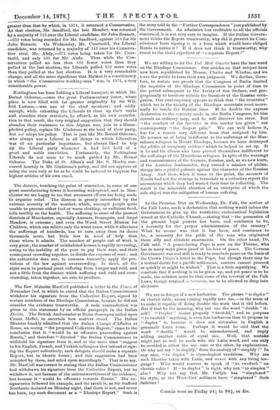The Rev. Malcolm Ma.cColl published a letter in the Times,
of November 2nd, in which he stated that the Italian Commissioner withdrew his signature from the Collective Report, signed by certain members of the Rhodope Commission, because he did not -consider the evidence trustworthy. A rude contradiction was given to this statement by an official paragraph in the Italian Diritto. The British Ambassador at Rome thereupon called upon Count Maffei, to ascertain how matters stood. The Italian Minister frankly admitted that the Italian Chargé d'Affaires at Rome, on seeing "the proposed Collective Report," came to the conclusion that it "would be an offensive proceeding against Russia," and therefore " directed " the Italian Commissioner to withhold his signature from it, and at the same time "suggest to his English, French, and Turkish colleagues that instead of sign- ing the Report collectively, each delegate should make a separate Report, but in identic terms ; and this suggestion had been accepted by them, and acted upon accordingly." That is to say, Mr. MacColl was correct in stating that the Italian Commissioner had withdrawn his signature from the Collective Report, but he withdrew it, not because of the untrustworthiness of the evidence, but because it "would be offensive towards Russia." His co- signatories followed his example, and the result is, as Sir Stafford Northcote declared on Monday night, that there is not, and never has been, any such document as a "Rhodope Report." Such is the story told in the "Further Correspondence "just published by the Government. An admission less creditable to all the officials concerned, it is not very easy to imagine. If the Italian Govern- ment thinks the Report trustworthy, why did it prevent its Com- missioner from signing it in a form which would have obliged Russia to notice it? If it does not think it trustworthy, why resort to the timid expedient of "a separate Report?"






































 Previous page
Previous page